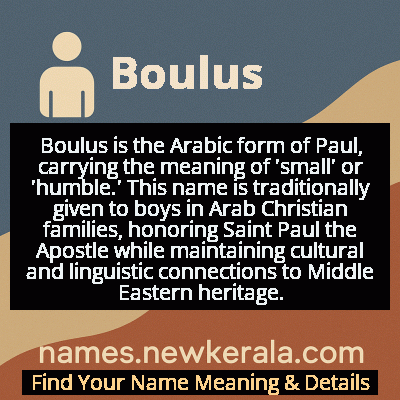Boulus Name Meaning & Details
Origin, Popularity, Numerology Analysis & Name Meaning of Boulus
Discover the origin, meaning, and cultural significance of the name BOULUS. Delve into its historical roots and explore the lasting impact it has had on communities and traditions.
Name
Boulus
Gender
Male
Origin
Muslim
Lucky Number
9
Meaning of the Name - Boulus
Boulus is the Arabic form of Paul, carrying the meaning of 'small' or 'humble.' This name is traditionally given to boys in Arab Christian families, honoring Saint Paul the Apostle while maintaining cultural and linguistic connections to Middle Eastern heritage.
Boulus - Complete Numerology Analysis
Your Numerology Number
Based on Pythagorean Numerology System
Ruling Planet
Mars
Positive Nature
Generous, passionate, energetic, and humanitarian.
Negative Traits
Impulsive, impatient, moody, and can be overly emotional.
Lucky Colours
Red, maroon, scarlet.
Lucky Days
Tuesday.
Lucky Stones
Red coral, garnet.
Harmony Numbers
1, 2, 3, 6.
Best Suited Professions
Military, sports, philanthropy, leadership roles.
What People Like About You
Courage, energy, leadership, generosity.
Famous People Named Boulus
Boulus al-Bushi
Religious Scholar
Coptic Christian bishop and theologian who wrote extensively in Arabic during the Mamluk period
Boulus al-Haddad
Religious Leader
Maronite Catholic Archbishop of Cyprus who played significant role in Christian-Muslim relations
Boulus Qarqash
Religious Scholar
Syriac Orthodox scholar known for his theological works and contributions to Arabic Christian literature
Boulus Khoury
Business Leader
Prominent Lebanese businessman and philanthropist in the Middle East
Name Variations & International Equivalents
Click on blue names to explore their detailed meanings. Gray names with will be available soon.
Cultural & Historical Significance
The name's usage across different Christian denominations in the Arab world—including Coptic, Maronite, Greek Orthodox, and Catholic communities—demonstrates its ecumenical appeal and enduring legacy. Historically, many prominent Arab Christian theologians, scholars, and religious leaders bearing this name have contributed significantly to Arabic Christian literature and interfaith dialogue, making Boulus a name that represents both religious devotion and intellectual achievement in Middle Eastern Christian culture. The name also reflects the complex history of Christianity in the Arab world, serving as a reminder of the ancient Christian communities that have maintained their faith and cultural identity throughout various historical periods.
Extended Personality Analysis
Individuals named Boulus are often perceived as thoughtful, intellectually curious, and spiritually inclined. They tend to possess a natural inclination toward learning and contemplation, with many displaying strong analytical abilities and a methodical approach to problem-solving. The name's association with Saint Paul suggests traits of transformation, conviction, and the courage to stand by one's beliefs—qualities that often manifest in Boulus bearers as strong principles and moral integrity.
They are typically seen as reliable, humble individuals who value deep connections over superficial relationships, and many demonstrate a capacity for leadership tempered with compassion. The 'small' meaning underlying the name often translates into a personality marked by humility and service-oriented behavior, with many Boulus bearers showing particular strength in communication, education, or religious vocations where their thoughtful nature and conviction can positively influence others. Family and community often play central roles in their lives, and they frequently exhibit a balanced combination of traditional values and adaptive thinking that allows them to navigate both conservative and modern social contexts effectively.
Modern Usage & Popularity
In contemporary times, Boulus remains predominantly used within Arab Christian communities across the Middle East, particularly in Lebanon, Syria, Egypt, Jordan, and Palestine. While not among the most popular names in these regions, it maintains steady usage as a traditional choice that honors religious heritage and family traditions. The name has seen some decline in urban areas where more modern names are preferred, but it continues to be respected as a classic, meaningful choice in religious families. Among the diaspora communities in Europe, North America, and Australia, Boulus serves as an important cultural identifier, helping maintain connections to Middle Eastern Christian heritage. Recent years have shown some revival of interest in traditional biblical names, which may contribute to maintaining the name's relevance among new generations.
Symbolic & Spiritual Meanings
Symbolically, Boulus represents transformation, spiritual awakening, and humble service. The name carries the metaphorical weight of Saint Paul's dramatic conversion on the road to Damascus, making it symbolic of profound personal change and redemption. The underlying meaning of 'small' or 'humble' adds layers of symbolism related to humility, service, and the idea that great impact often comes from modest beginnings. In cultural context, Boulus symbolizes the bridge between different worlds—connecting ancient biblical traditions with contemporary Arab Christian identity, and representing the enduring presence of Christianity in the Middle East. The name also carries connotations of scholarly pursuit and theological depth, reflecting Saint Paul's role as a foundational Christian theologian and writer whose epistles form a significant portion of the New Testament.

